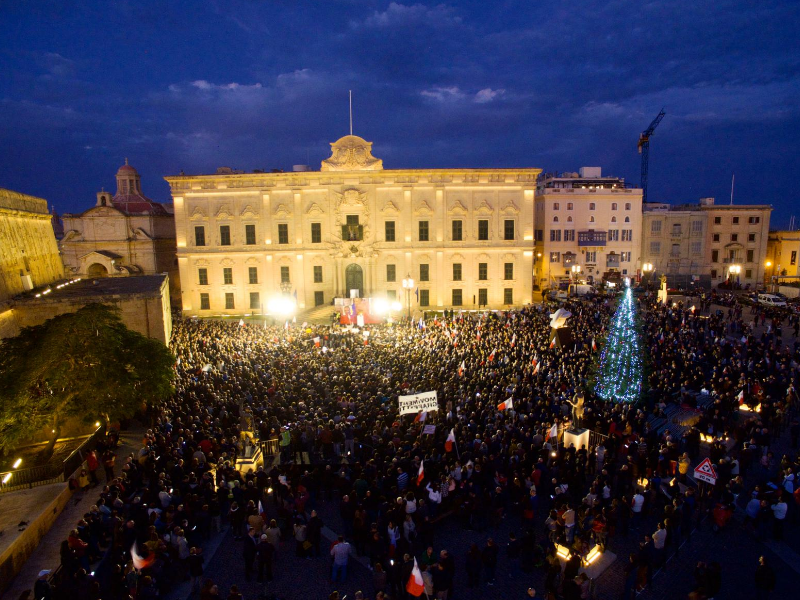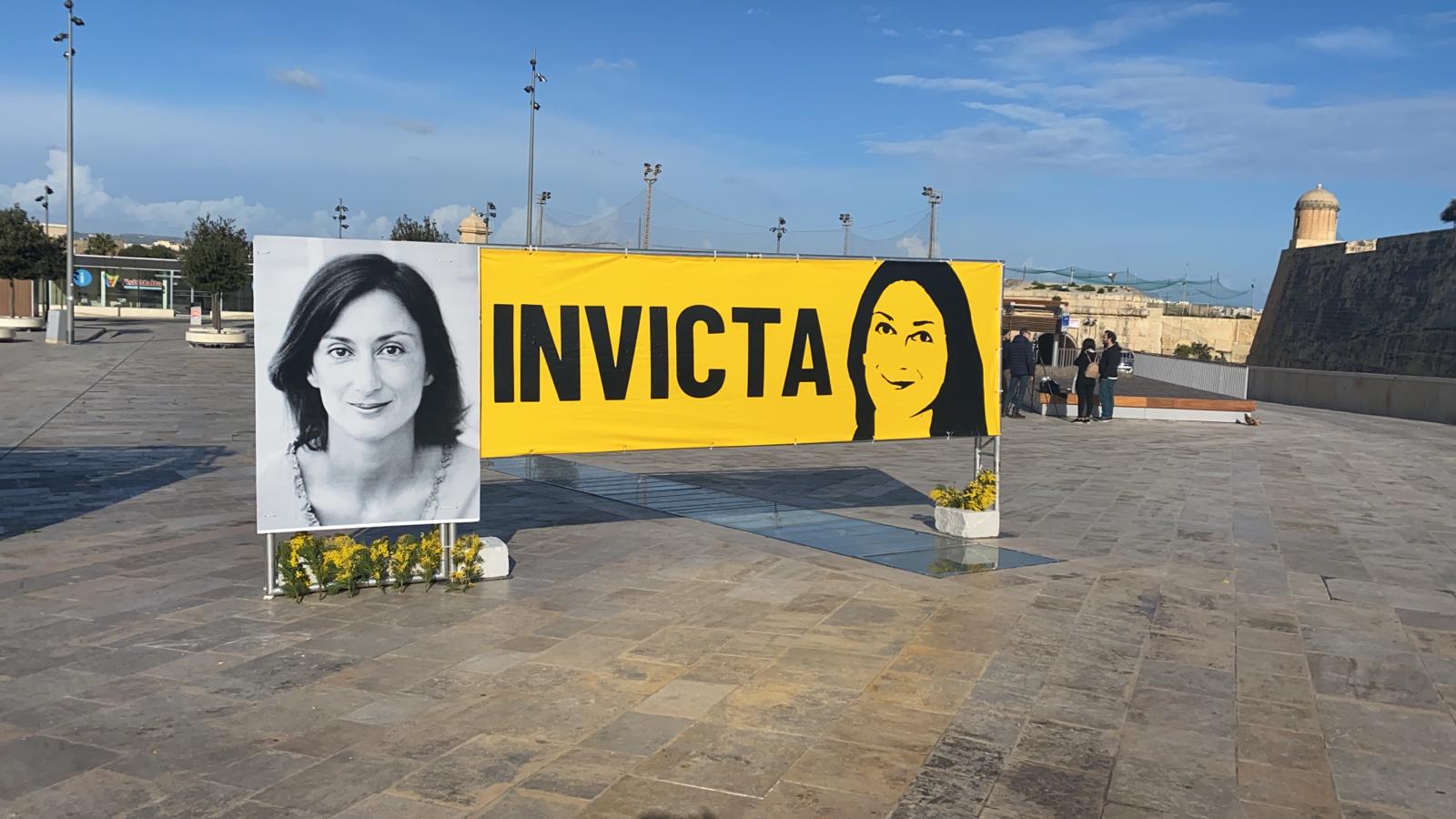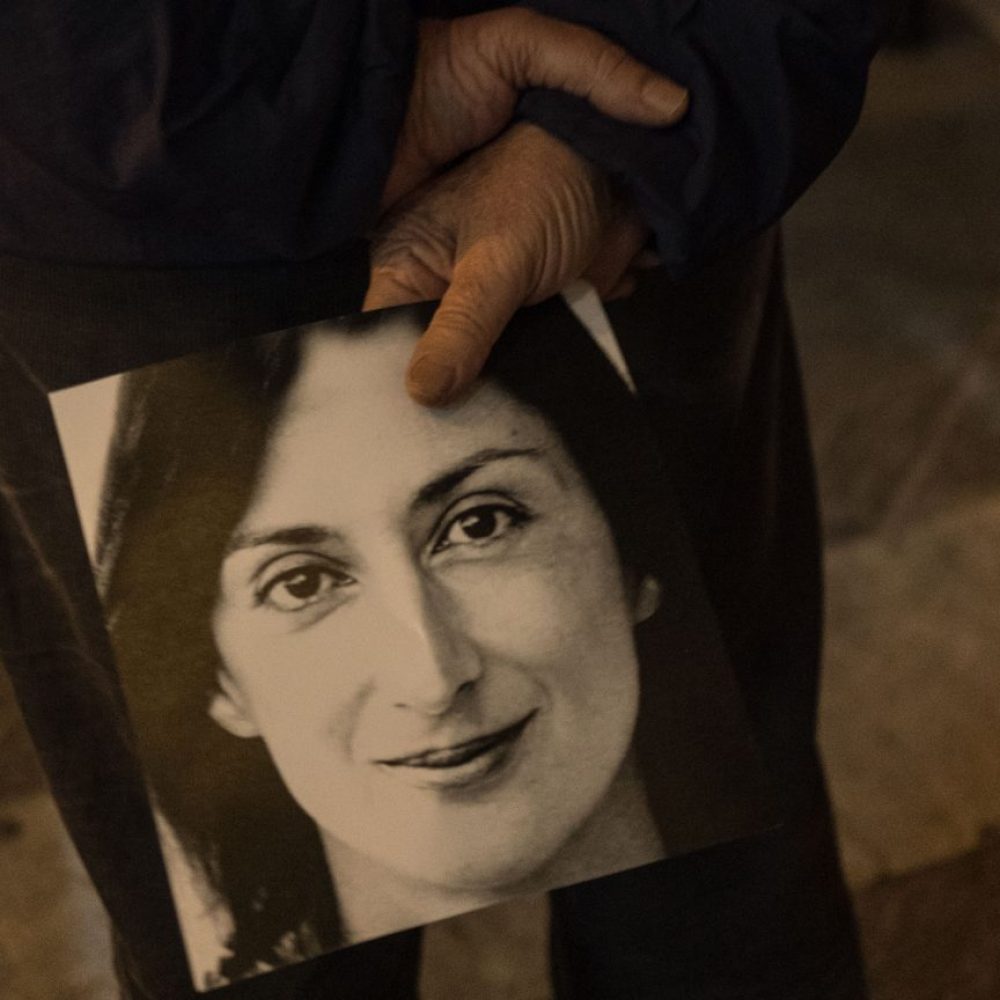It’s been nearly three years since Maltese investigative journalist Daphne Caruana Galizia was assassinated with a massive car bomb just down the road from her home.
Three contract killers were arrested months after her death and eventually charged with planting and triggering the bomb. But the struggle to discover the masterminds behind her assassination — and their motives — has been a frustrating tale of political interference, as the authorities in Malta did everything possible to avoid examining the role politicians may have played in both the murder and attempts to cover it up.
On the second anniversary of the journalist’s brutal killing by a car bomb a few metres away from her home, Justice for Journalists Foundation supported a joint effort between international press freedom organisation Reporters Without Borders and investigative news portal The Shift in Malta to publish a report detailing the lack of progress in the investigation and the reasons behind it.
Daphne died with 42 libel suits pending against her. Some 23 were filed by politicians, including the Economy Minister Chris Cardona, who had her bank accounts frozen after Daphne reported he had been seen in a German brothel when traveling on government business. Most of these libel cases are still ongoing even after her death.
The prime minister at the time, Joseph Muscat, treated the arrest of the hitmen as case closed and tried to move on. A former head of Europol complained that Maltese authorities were dragging their feet when it came to investigating who commissioned the murder.
Delegations from Europe sent to assess the country’s failing rule of law were always told “it’s in the courts” or “there’s a magisterial inquiry”. But Daphne’s family, civil society protestors, and a handful of independent journalists refused to let the story die.
A breakthrough finally came in late November 2019 when local business tycoon Yorgen Fenech was arrested while trying to flee the country by yacht in the pre-dawn hours. He was charged with commissioning the three hitmen to kill the journalist.
Fenech is the one of the richest men in Malta, heir to a family business empire. His Tumas Group held shares in shipping industries, nightclubs, hotels, and a casino, with assets said to be worth several hundred million euros.
Tumas Group also controlled 30% of the Electrogas power station, of which Fenech was one of the directors. It was one of the most corrupt deals struck under the present government.
Daphne was working her way through a massive collection of documents related to the Electrogas deal that had been sent to her by a whistleblower months before she was killed.

Fenech’s entanglements with the project didn’t end with the public shares controlled by the family business. Earlier in 2019, Reuters had identified him as the owner of a mysterious Dubai company called 17 Black. The company was used to transfer illicit funds related to Electrogas from an Azerbaijani businessman, and was linked to Panama company structures set up by two top officials in Muscat’s government: his chief of staff Keith Schembri, and former Energy Minister Konrad Mizzi.
The last person Fenech called before his dramatic arrest was Schembri.
News of the arrest sparked a wave of daily protests that brought the country to a halt, disrupted sittings of parliament, and caused the resignation of Muscat, Schembri and Mizzi. Yet hope that things may change were quickly dashed.
The compilation of evidence against Fenech got underway in January of this year, aided by the testimony of middleman Melvin Theuma, who turned state witness in exchange for immunity.
That case is now in jeopardy after Theuma was found at home with his throat and wrist slashed and stab wounds to his abdomen. He was under police protection at the time, and the authorities claim his wounds were self-inflicted. Theuma survived, but it’s anyone’s guess what this means for the case against Fenech.
The compilation of evidence isn’t the only hearing taking place in Malta. There’s also a public inquiry into Daphne’s assassination, tasked with examining the circumstances of these events, whether the State played a role in her death, and whether her death could have been prevented.
The inquiry was established after intense pressure from the Council of Europe and the European Parliament which sent several delegations to Malta to examine the rule of law in the troubled country. The government did everything it could for two years to avoid the inquiry, and when given a deadline and an ultimatum, attempted to include partisan judges on the board and to set terms of reference favourable to the government. These efforts failed.
The public inquiry was convened in January, and the details revealed both here and in the compilation of evidence proceedings against Fenech have raised alarming concerns about political involvement in the assassination, systemic corruption, and attempts to pervert the course of justice by shielding politically exposed persons from scrutiny.
Here’s what we’ve learned so far:
- Deputy Police Commissioner Silvio Valletta was keeping chief of staff Schembri informed of his investigation into Daphne’s murder, and this information was also being passed to Fenech.
- Valletta vacationed with Fenech on the latter’s yacht in September 2018, at a time when the businessman was already the lead suspect.
- Fenech knew middleman Theuma was about to be arrested in a money laundering probe and warned him of an impending raid. He also knew the date of the raid in advance, where police would search, and which officer would arrest Theuma.
- Fenech had close ties to former prime minister Muscat and Schembri, with whom he exchanged frequent text messages, even after he became the main suspect in the assassination. He was even a guest at Muscat’s parties.
- Fenech gave Muscat lavish gifts, including a limited edition Bvlgari watch worth some €20,000, a rare bottle of Petrus wine vintage 1974 (the year of Muscat’s birth) worth thousands of euros, and expensive wines to commemorate the birthday of Muscat’s twin daughters.
- Fenech gave Schembri a white-gold watch worth €12,000 for his 40th birthday, and paid the bill for Schembri’s cancer treatments in the United States. The two men vacationed together multiple times.
- Fenech, Muscat and Schembri attended the small private wedding of Pilatus Bank owner Ali Sadr Hasheminejad in Florence, Italy, all expenses paid. Pilatus Bank was closed by the European Central Bank and Ali Sadr was arrested in the US and charged with money laundering and violating sanctions against Iran. The bank was also at the centre of a scandal involving money laundering and offshore corporations set up for Schembri, Mizzi, and allegedly, for Muscat. No action against Ali Sadr has been taken by the Maltese authorities.
- Ian Abdilla, former head of the police Economic Crimes Unit, admitted police had done nothing about the Panama Papers revelations, and that Mizzi and Schembri — the two men exposed as having set up offshore company structures within 72 hours of the Labour Party’s election — were never questioned.
- Abdilla also chose not to question Brian Tonna and Karl Cini, whose company NexiaBT had set up the Panama company structures, and were auditors for both Schembri’s private companies and for the Electrogas power station. They sat on boards that determined the deal would go ahead.
- Attorney General Peter Grech had issued written advice to the police “to tread very carefully on the Panama Papers, because there was trouble brewing in the country”. While journalists were facing one libel case after another for revealing the documents and their connections to power, government officials kept asking “where is the evidence?” – it is now clear the police were sitting on it, placing journalists at greater risk for what they were exposing.
- The Attorney General also advised the police that it would be “highly intrusive” to seize evidence from NexiaBT’s servers, saying it would carry a considerably high legal risk which could be “counterproductive”. He remains in his role.
- Fenech was worried about the monthly vigils held to commemorate Daphne’s death, and repeated protests and calls for justice by civil society activists. But he assured Theuma they would be safe as long as the governing Labour Party stayed in power.
Fenech’s confidence was well-founded. The public inquiry detailed the intense State-sponsored online hate campaign against Daphne, which intensified when the Labour Party took power in 2013.
These secret and closed online groups — which included senior government and Labour Party officials as members — sought to discredit Daphne’s investigations into government corruption while coordinating a counter-narrative for their followers to drown the stories.
They were aided by a “personal blog” written by an official in the Office of the Prime Minister, on government pay, which that writer characterises as being about “retaliation” for Daphne’s “attacks”.
When she was brutally murdered, members of those same closed social media groups celebrated her death. Then the attacks turned on other journalists and civil society activists calling for truth and justice.
The coronavirus pandemic caused some delays in the public inquiry, and the near-fatal injury of state witness Melvin Theuma has cast shadows of uncertainty over the Fenech trial. So far, not a single person has been convicted for her death because of resistance in the course of justice.
Yet the trials and the public inquiry are ongoing thanks to investigative journalists in the country who have continued to build on her investigations and the sheer determination of her family and civil society activists to demand the truth about her death.
The fight for justice for Daphne continues, as does the demand for real reforms to ensure good governance for the citizens of Malta.

The following project is weekly Maltese Roundups prepared by The Shift News (Malta) offering the latest news in Daphne Caruana Galizia case.

